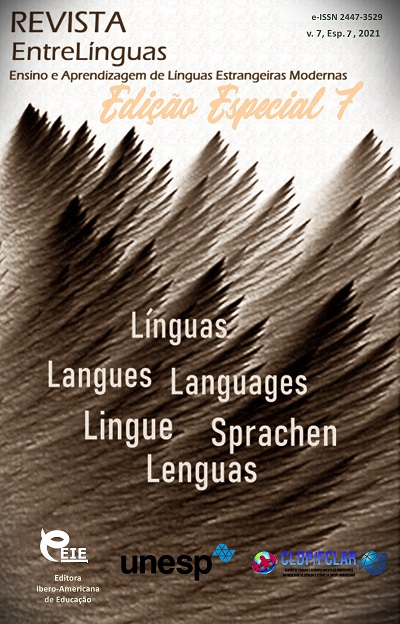The frequency and range of personal pronouns in academic texts
DOI:
https://doi.org/10.29051/el.v7iesp.7.16335Keywords:
Personal pronouns, Academic texts, Russian academic discourse, Text complexity, Corpus, Disciplinary differencesAbstract
Researchers have been researching English text complexity and the impact of text metrics upon its challenge for various categories of readers for years and years. Significant measures have been taken lately towards a more excellent knowledge of changes in Russian texts of multiple genres. The present survey is a pilot corpus-based investigation concentrated upon variations in academic literature in Russian as represented in 2 books for the 9th-grade learners of secondary schools in Russian : (1) Biology. Human and health by A. M. Tsuzmer, O L. Petrishina, (2) Social Studies by Nikitin A.F., Nikitina T.I. The study subject that leads this research is: Are there notable diversity in the number of the personal and possessive pronouns applied in Russian classroom courses upon Social studies and Science? The obtained outcomes exhibit a significant trend of impersonality in the Science textbooks (TSU) under investigation. This means that the book writers on Science (TSU) prefer depersonalization strategies: they employ impersonal constructions and agentless passive, which decrease texts’ narrativity and hamper students’ understanding of the texts. The research findings present an influential guide that the current variations in the distribution of personal, possessive and reflective, pronouns in science and social coursebook examples are associated with text complexity. Moreover, those conclusions have significant connections for comprehending variations among social and Science texts and similar metrics. They suggest the language structures employed by authors of various disciplines differ considerably. The variations in the number and relative frequencies of pronouns are significant and compatible to indicate that each subcorpora can hold a different linguistic profile of characteristics. Additional examinations in the related sphere are recommended to resolve deficiencies in the size and range of texts adopted for the prevailing study.
Downloads
References
ANTCONC, Softpedia. URL: http://www.softpedia.com/get/Science-CAD/AntConc.shtml. 2018.
BAKHTIN, M. The problem of speech genres and the problem of the text in linguistics, philology and the human sciences: an experiment in philosophical analysis. Bakhtin: Speech Genres and Other Late Essays, translated by Vern W. McGee, edited by Caryl Emerson and Michael Holquist, 250-317. 1986.
BOLDYREVA, A.A. Peculiarities of Expressing Author’s I in Academic Discourse [Osobennosti vyrazheniya avtorskogo «ya» v nauchnom diskurse]. URL: http://tpll999.narod.ru/.
GABITOV, A., SOLNYSHKINA, M., SHAYAKHMETOVA, L., ILYASOVA, L., & AкBAROVA, S. Text Complexity in Russian Textbooks On Social Studies. Revista Publicando, 4(13 (2)), 597-606. 2017.
GERGOKAEVA, D.D. Egocentrism of Linguistic Discourse [Egocentrism lingvisticheskogo diskursa]. Moscow. 2008.
GLUSHKO, M.M. Structure of the academic text in terms of systemized nature of its pragmatic, semantic and syntactic characteristics. Linguistic researches of Academic Discourse [Organizatsiya nauchnogo teksta v svete sistemnosti ego pragmaticheskikh, semanticheskikh i sintaksicheskikh kharakteristik. Lingvisticheskie issledovaniya nauchnoi rechi]. Moscow. 1979.
HARWOOD, N. ‘We do not seem to have a theory… The theory I present here attempts to fill this gap’: Inclusive and exclusive pronouns in academic writing. Applied linguistics, 26(3), 343-375. 2005.
IVANOV, V.V. Odd or Even. Asymmetry of the Brain and Sign Systems [Chet i nechet. Assimetriya mozga i znakovykh system]. Moscow. 1978.
IVANOV, V.V., SOLNYSHKINA, M.I., & SOLOVYEV, V.D. Efficiency of text readability features in Russian academic texts. Komp'juternaja Lingvistika i Intellektual'nye Tehnologii, 17, 284-293. 2018.
MIROSHNICHENKO, A. Interpretation of Discourse: Basics of Linguistic and Ideological Analysis [Tolkovanie Diskursa: Osnovy Lingvisticheskogo i Ideologicheskogo Analiza]. Rostov-na-Donu. 1995.
National Corpus of Russian Language. (2018) URL: http://www.ruscorpora.ru/search-main.html
NIKITIN, A.F., & NIKITINA, T.I. Social Studies. Textbook. Drofa, 2019.
PYANKOVA, T. M. ABC perevodchika nauchno-tekhnicheskoi literaturi [ABC of scientific and technical literature translation]. Moscow: Letopis. 1994.
ROLAND, D., DICK, F., & ELMAN, J. L. Frequency of Basic English Grammatical Structures: A Corpus Analysis. Journal of Memory and Language, 57(3), pp.348–379. 2007.http://doi.org/10.1016/j.jml.2007.03.002.
School textbooks and manuals (2017). Vseuchebniki. URL: http://vseuchebniki.net//
SOLNYSHKINA, M.I., KAZACHKOVA, M.B., VARLAMOVA, E. V., & ILYASOVA, L.G. The Use of Pronouns in Russian Classroom Textbooks: a Quntitative Study, 4th International Conference on Advances in Education and Social Sciences. Abstracts & Proceedings of Adved 2018, 688-696. 2018.
SOLOVYEV, V., SOLNYSHKINA, M., GAFIYATOVA, E., MCNAMARA, D., & IVANOV, V. Sentiment in academic texts. In 2019 24th Conference of Open Innovations Association (FRUCT) (pp. 408-414). IEEE. 2019.
SOLOVYEV, V., SOLNYSHKINA, M., IVANOV, V., & BATYRSHIN, I. Prediction of reading difficulty in Russian academic texts. Journal of Intelligent & Fuzzy Systems, 36(5), 4553-4563. 2019.
TSUZMER, A.M., & PETRISHINA, O.L. Biology. Human and health. Textbook. Prosveshchenie. 2001.
VASSILEVA, I. Who am I/who are we in academic writing? A contrastive analysis of authorial presence in English, German, French, Russian and Bulgarian. International Journal of Applied Linguistics, 8(2), 163-185. 1998.
ZASORINA, L.N. (Ed.) Frequency Dictionary of Russian. M .: Russian language, 29-804. 1977.
Downloads
Published
How to Cite
Issue
Section
License

This work is licensed under a Creative Commons Attribution-NonCommercial-ShareAlike 4.0 International License.
Os manuscritos aceitos e publicados são de propriedade da Revista EntreLínguas. Os artigos publicados e as referências citadas na Revista EntreLínguas são de inteira responsabilidade de seus autores.
Transferência de direitos autorais – autorização para publicação
Caso o artigo submetido seja aprovado para publicação, já fica acordado que o(s) autor(es) autoriza(m) a UNESP a reproduzi-lo e publicá-lo na EntreLínguas, entendendo-se os termos “reprodução” e “publicação” conforme definição respectivamente dos incisos VI e I do artigo 5° da Lei 9610/98. O artigo poderá ser acessado pela rede mundial de computadores (Internet), sendo permitidas, a título gratuito, a consulta e a reprodução de exemplar do artigo para uso próprio de quem a consulta, desde que haja a citação ao texto consultado. Essa autorização de publicação 328 EntreLínguas, Araraquara, v. 1, n .2, p. 323-328, jul./dez. 2015 não tem limitação de tempo, ficando a UNESP responsável pela manutenção da identificação do(s) autor(es) do artigo. Os artigos publicados e as referências citadas na Revista EntreLínguas são de inteira responsabilidade de seus autores.











